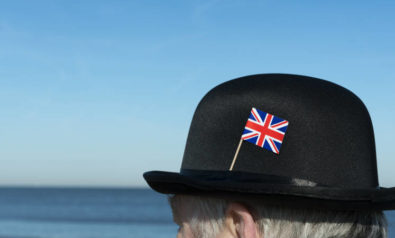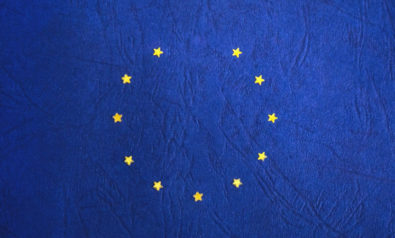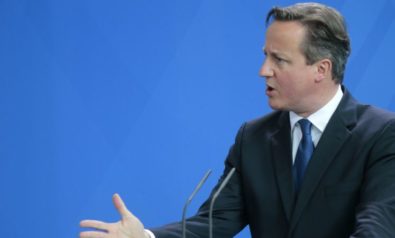Perhaps more than ever in the UK, so many people are going to have to fight just to be seen as human.
I’ve carried my book bag back and forth to the library three times a week for about two years. I bought it from the Jewish Museum in North London because I liked it. The word schlep, written on the side, perfectly describes my regular hour-long trek through Central London with heavy stuff for a day in the library. It also makes me smile. It reminds me of growing up in a lively Jewish family where such phrases littered otherwise very English sentences.
On a train, I noticed a lad and his girlfriend looking at me and my bag, which was on my lap. When they spotted me looking back at them, he told me to “fuck off back to Israel with the other yids.”
Nobody else in the packed rush hour carriage reacted, despite almost certainly having heard. We were, after all, sitting in that very particular silence that befalls a morning commuter train. I got off at the next stop, not really even noticing that I was several short of my destination, I was shaking and very upset. I thought about nothing else for the rest of the day.
I have never been targeted in this way before but my experience, it is quickly becoming apparent, is not an isolated one in post-Brexit Britain.
“Project Hate”
I know there were racist people before the referendum campaign, and I know there would have continued to be had the country voted to remain in the European Union (EU). But we must comment on the fact that so much of the pro-Brexit campaign rested on mainstreaming the most toxic views about “outsiders” that have swirled around in public discourse for a long time. Phrases such as “project fear” and “project hate” were bandied around by both Remain and Leave activists, and I think it is precisely this oversimplified, soundbite politics in particular that means we keep missing the point.
What we’re seeing is not really hate or fear. I don’t think the lad on the train was frightened of me, nor do I think he hates me. That assumes that he saw a person when he made his comment. And I don’t think he did.
What the Vote Leave campaign actually did in the run up to the referendum was tap into a broader current of dehumanization—of a generalized “other” that has been creeping in for some time. The space for proper discussion and debate about immigration, asylum and humanity was utterly diminished by that campaign and replaced with the rhetoric of the non-human—of the parasite.
Anti-Human Narrative
This alarming anti-human narrative has found some level of legitimization in recent months. A parasite arrives uninvited and
unwanted, takes without giving, disrupts the local environment and lays claim to that which is not its own.
This is the narrative some factions of the right in particular have encouraged support for. Depicting Britain as a bunkered state, cowering under the weight of refugee “swarms” and apparently at “breaking point,” there seems to have been a systematic stripping away of humanity here. Individual stories of war, desperation or simply seeking a better life in a more prosperous country get bulldozed by blanket narratives of pestilence.
It has been argued that nationalized violence and aggression toward particular groups is preceded by a denial of the victim’s reality as a human being. So when that lad on the train had no problem voicing his thoughts on my heritage to me, as has been happening all over the country over the past couple of days, I do not, as I said, believe this was because he hates me or is frightened of me. It is because he does not see me. Not me, the person. He sees me, the parasite, the me he has been told to look out for, the me that needs to be eradicated.
I know my experience does not come close to that of those fleeing war-ravaged countries only to find themselves arriving now in increasingly hostile places of refuge. I was able to get up, walk away, be upset, discuss my experience on social media and then go about my peaceful and charmed life once more. I must register my frustration with myself for not confronting him and challenging his comment to me. But more than anything I am so sorry that now, perhaps more than ever in the United Kingdom, so many people are going to have to fight just to be seen as human.
*[This article was originally published by The Conversation.]
The views expressed in this article are the author’s own and do not necessarily reflect Fair Observer’s editorial policy.
Photo Credit: Hernán Piñera / Flickr
 We bring you perspectives from around the world. Help us to inform and educate. Your donation is tax-deductible. Join over 400 people to become a donor or you could choose to be a sponsor.
We bring you perspectives from around the world. Help us to inform and educate. Your donation is tax-deductible. Join over 400 people to become a donor or you could choose to be a sponsor.
Support Fair Observer
We rely on your support for our independence, diversity and quality.
For more than 10 years, Fair Observer has been free, fair and independent. No billionaire owns us, no advertisers control us. We are a reader-supported nonprofit. Unlike many other publications, we keep our content free for readers regardless of where they live or whether they can afford to pay. We have no paywalls and no ads.
In the post-truth era of fake news, echo chambers and filter bubbles, we publish a plurality of perspectives from around the world. Anyone can publish with us, but everyone goes through a rigorous editorial process. So, you get fact-checked, well-reasoned content instead of noise.
We publish 2,500+ voices from 90+ countries. We also conduct education and training programs
on subjects ranging from digital media and journalism to writing and critical thinking. This
doesn’t come cheap. Servers, editors, trainers and web developers cost
money.
Please consider supporting us on a regular basis as a recurring donor or a
sustaining member.
Will you support FO’s journalism?
We rely on your support for our independence, diversity and quality.

































